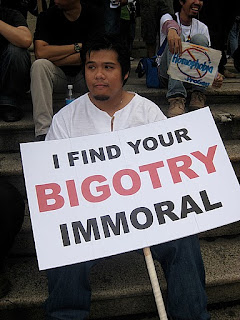Lesbians, bisexual women and transgender (LBT) people in Asia experience forced institutionalization in mental rehabilitation clinics, electro shock treatment as aversion therapy, sexual harassment in school and at work, threats of rape to make you straight, school expulsions, eviction by landlords, police kidnapping, family violence, and media stigmatization.
Lesbians face discrimination in the workplace because of their gender and their sexual orientation. Employment and job promotions are denied if women look too masculine. Male coworkers stalk and sexually harass lesbians who cannot report for fear of backlash and retaliation.
Transgender/gender variant people are marginalized in their jobs, and are targeted for blackmail, harassment, and sexual violence from the community or people in positions of authority like the police. Activists who defend the rights of LBT people experience threats to their safety, in some cases, harassment, attacks, even torture and abuse, with police participating in or doing nothing to stop these violations.
Frequently, LBT people in Asia face violence in the “private” sphere—by members of immediate and extended family, community and religious groups. This violence includes beatings, home confinement, ostracism, mental and psychological abuse, verbal abuse, forced marriage, corrective rape and in some cases killings to restore family honor.
The fear of family and community violence is often exacerbated by police complicity, when police officers join forces with family members to break up lesbian couples by arresting, detaining and intimidating them. In some cases, charges of kidnapping, trafficking or child abuse are brought against one of the partners. Police officers also charge lesbians under sodomy laws even if the law does not explicitly include lesbianism.
Compounding the situation is the state’s lack of due diligence in applying existing laws that penalize domestic violence and sexual violence to LBT people who are victimized, thus denying them access to complaint mechanisms and opportunities for redress.
Victims themslves don’t turn to these laws for protection because they lead double lives, and exposing the violence invites disapproval, rejection, discrimination and further violence. Such a vicious cycle allows violence to go unreported, unrecognized, and unchecked.
In some instances, media does report on suicide pacts or foiled same sex marriages but the coverage does not name what happened as abuse or suppression of rights. Instead, the media publicity reinforces the stigma against LBT people and makes them the object of ridicule and shame.
Many humanitarian organizations and women’s rights NGOs fail to understand the severity of violence and discrimination based on sexual orientation and gender identity. Government reports to treaty monitoring bodies as well as shadow/alternative reports by women’s right NGOs make no reference to violence against LBT groups and individuals for the most part because sexual rights for women, beyond reproductive rights, are rarely a priority for the women's human rights movement, and the demand for women’s sexual autonomy is treated as incidental or an inferior right compared to the other rights.
At the same time, when LBT activists lobby their governments or treaty bodies like CEDAW or their national human rights institutions, they often lack the data and documentation to support their claims of violence and discrimination, which contributes to the under-recognition of the problem.
In 2007 and 2008, the International Gay and Lesbian Human Rights Commission (IGLHRC) met with grassroots and national LGBT groups in Asia to identify their key priorities and needs. From women’s groups, IGLHRC heard that homophobic and transphobic violence against women was their number one issue—even if some of the groups lacked the capacity and resources to make this issue their priority.
To bring visibility to the issue, some groups conducted local studies in their service vicinity, but these were limited in scope. Regional level data gathering on violence against lesbians, bisexual women and transgender (LBT) people in Asia has not yet been carried out.
In response to what we heard, IGLHRC convened a Strategy Workshop in Quezon City, Philippines, May 27-30, 2009 to start a cross-country dialogue among activists from countries in Asia. Their reports confirm that homophobic and transphobic violence against non-heteronormative women in the region is under-reported, under-documented, and consequently eclipsed by other concerns in the region.
This lack of data contributes significantly to lack of funding for services and lack of legislator attention. Few government efforts to end violence against women involve LBT groups.
LBT people are often denied protections from and remedies for violence that other people, including heterosexual women receive from anti-discrimination laws, domestic violence legislation and rape laws. In countries with minimal or poor state responses to violence against women, LBT people are even more marginalized because of the double or triple jeopardy that renders their suffering less visible.
Benefits won by women’s rights movements often does not extend to LBT individuals, although many are part of these movements in their countries. Despite these inconsistencies, LBT activists are working to raise awareness about violence at state and non-state levels in many parts of Asia.
The following country summaries are based on the cross-country exchange convened by IGLHRC in May 2009. They are a prelude to the two-year in-depth qualitative and collaborative research and documentation project that will be undertaken in June 2010 by IGLHRC and LBT partners in Asia, and which will culminate in local advocacy initiatives to stem violence against women on the basis of their sexual orientation, gender identity and gender expression.
Some of these activities will be linked to existing national, regional and/or international public awareness and violence prevention campaigns such 16 Days of Activism to End Violence Against Women, the UN Secretary General’s Campaign to End Violence Against Women, International Day Against Homophobia, International Women’s Day, Campaign to Just Say No to Violence and Impunity, etc.
386-1








 Join our page
Join our page


0 comments:
Post a Comment